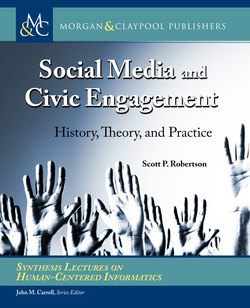Читать книгу Social Media and Civic Engagement - Scott P. Robertson - Страница 8
На сайте Литреса книга снята с продажи.
ОглавлениеPreface
At this moment, Facebook is fighting a battle over a massive disclosure of personal information about essentially all of its users during the 2016 U.S. presidential campaign; the social analytics company Cambridge Analytica is being revealed as a major player in microprofiling voters in that same election; the role of Russian bots and fake news factories in undermining democratic discourse in social media worldwide is being revealed; and the president of the U.S. is unnerving the world as a frequent stream-of-consciousness Twitter user. It is basically impossible to keep up with the rapid changes that the internet in general, and social media applications in particular, are bringing to the arenas of political discourse and civic engagement. Meanwhile, the Pew Internet and American Life Project generates a new report on social media use just about every week, and every HCI, CSCW, sociotechnical, and digital government conference brings on a slew of papers on exactly the topic of this book. This has made writing about social media and civic engagement a challenging task.
The first impression that many readers will probably have in browsing the contents is, “What about X?,” where X is the latest thing that happened after mid-2018. Consequently, my strategy here is to bring together research to date on the internet, social media, and civic life that will be somewhat foundational to understanding this rapidly changing field. The book, therefore, concentrates heavily on both history and theory, in addition to practice. History because we got to where we are after many iterations of lively experimentation with community-oriented ICTs. In every technology cycle, researchers and developers pushed the envelope to see how technology could augment and enhance political and social discourse. It is enlightening to see what has endured, what has disappeared, and what has morphed. Theory because the use of globally networked social technologies for political discourse touches so many interesting, theory-rich fields: political science, sociology, psychology, media studies, network science, and more. No matter what happens in the realm of technology, theory will always apply in a novel way. So, it is important to understand how these theories apply in new sociotechnical contexts and, in turn, to see how theory is impacted by novel perspectives.
I have chosen to examine studies of engagement in two major categories: political engagement in democratic situations and political engagement in confrontational situations. Both are about changing the way things are, which is why we engage in political discourse in the first place. Social media has been up to the task of assisting with change in both cases, but in very different ways.
The book ends with challenges, which seem at times to overwhelm the opportunities. I began my research in this area a little over ten years ago, which just about tracks the lifespan of social media. Like many (not all), I started out as an optimist about the promise of social media for broadening participation and enhancing civic engagement. At this moment in time, however, it can seem more like a nightmare, as bad actors discover the possibilities of social platforms and related technologies. In fact, I think we are at a sobering inflection point, probably the same one that is encountered by all technology optimists as their favorite tools enter the larger sphere of public use. For better or worse, social media for civic engagement has “come of age.”
This book will hopefully serve as a guidepost for going forward by showing where we have been, describing how we got here, and highlighting what is important in this vital area of research and practice.
